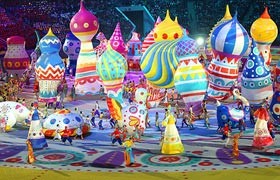The Winter Olympics in Sochi run from 7-23 February 2014, followed by the Paralympics which run from 7-16 March. Here we provide a few ideas to help you explore these events in class.
We start off by having a think about opening ceremonies as a way to highlight a country's culture and achievements. We examine why this is the first Winter Olympics to include women's ski jumping. And we explore the controversy surrounding the Sochi games and what actions can be taken.
Opening ceremonies - comparing cultures
The links in the table below take you to film clips and photos from the past few Olympic opening ceremonies (summer and winter). You could split the class into groups to discuss:- What aspects of the country's culture did the ceremonies focus on?
- Was anything important missed out?
- What would they feature if they had to organise a ceremony?
- How easy is it be to be 'objective' about your own country's ceremony?
Waiting 90 years to jump
The Sochi Games are the first ever Winter Olympics to include women's ski jumping. (Men's ski jumping has been an Olynmpic sport since 1924.) Various reasons have been given for this exclusion of the sport - do your pupils think any of these are valid?- "not ... appropriate for ladies from a medical point of view" (Gian Franco Kasper, president of the International Ski Federation, 2005)
- Not enough competitors to make it an Olympic sport (Jacques Rogge, president of the International Olympic Committee, 2008)
- It can damage their ovaries... or at least their knees (various people, over many years)
- "Women have a different purpose — to have children, do housework, to create a family home.” (Russian men’s ski jumping coach Alexander Arefyev, 2014)
To boycott... or not to boycott?
There were calls to boycott the Sochi Winter Olympics due to a law being passed in Russia (in June 2013) which makes it illegal to "promote homosexuality". Human rights campaigners say that, in effect, this makes it a crime to be openly gay in Russia, and thus denies lesbian, gay, bisexual and transgender (LGBT) people the right to 'be themselves'. How does this legislation compare to other countries? The BBC has a useful feature which shows worldwide Where is it illegal to be gay? including a legislation timeline dating right back to 1789. The campaigning and lobbying organisation Stonewall does not support a boycott. It is working long-term with partners in Russia and is also encouraging the UK government to put pressure on the Russian government. You can read more in their briefing, downloadable from their website. See also their education for all pages. An opinion piece, Why I believe we should boycott Sochi, by Kristopher Wells from the University of Alberta, is available on the TES Resources website (you will need to register to download it). The Morningside Center for Teaching Social Responsibility, a US-based organisation, has a useful lesson plan. that can be adapted for UK students: Russia's anti-gay laws & the 2014 olympics - how to respond? Another useful resource from the Morningside Center is The Olympics' history of controversy - which explores how politics and the Olympics have often gone hand-in-hand.- Should there have been an international boycott of the Berlin Olympics of 1936?
- Read how the US boycott of the Moscow Olympics in 1980 affected an American athlete. The subsequent boycott of the Los Angeles Olympics by 14 'Eastern bloc' countries four years later was widely seent as a 'tit for tat' response.
Some organisations have produced special 'rainbow' logos
- Target the Games' sponsors: for example it doesn't look good if their logo is on the uniform of someone attacking protestors
- President Obama included gay athletes in the US delegation to Russia
- Any other examples?

